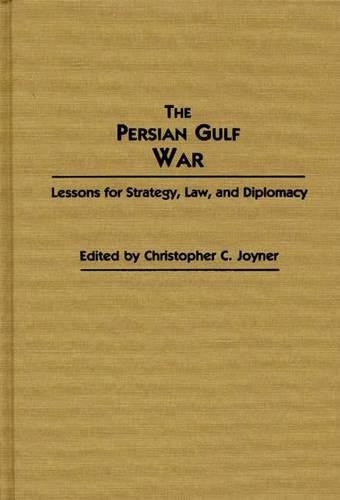
The Persian Gulf War: Lessons for Strategy, Law, and Diplomacy
(Hardback)
Publishing Details
The Persian Gulf War: Lessons for Strategy, Law, and Diplomacy
By (Author) Christopher C. Joyner
Bloomsbury Publishing PLC
Praeger Publishers Inc
21st August 1990
United States
Classifications
Tertiary Education
Non Fiction
Warfare and defence
International relations
955.054
Physical Properties
Hardback
272
Width 156mm, Height 235mm
595g
Description
Although the stability of the Persian Gulf region has been of rising importance since World War II, it was during the 1980s, when the Iran-Iraq War threatened to upset the balance of power in the region, that its importance became even more magnified. This collection of essays surveys the current state of that region, placing into clearer perspective the political, security, and diplomatic dimensions of the recently ended war. By reevaluating the political landscape of the Gulf, the book produces a gauge for better assessing those factors and forces that affected the conflict's outcome and that will continue to influence future political and security developments in the region. The volume begins with an introduction by the editor that examines the geography of the Gulf and the primary geopolitical factors that influenced perceptions of the region during the war. The essays are then divided into two sections covering Strategic and Political Dimensions and Diplomatic and Legal Dimensions. Topics covered in the first section include the roots of the crisis, Soviet, Israeli and Arab Gulf states' interests in the conflict, U.S. policy in the region, and the role of U.S. military forces. Section two discusses the reflagging of Kuwaiti tankers, the United Nations' involvement, and the cease-fire negotiations. The book concludes with a selected bibliography and an index. This study will be an important resource for courses in political science, diplomacy, and Mid-East history, as well as a significant addition to both public and university libraries.
Reviews
This edited volume brings together 14 essays on the Iraq-Iran War of 1980-88. The contributions are divided into two parts exploring the strategic, political, diplomatic, and legal aspects of a protracted and brutal conflict between Saddam Hussein's Arab nationalist Baath regime and Ayatollah Khomeini's Islamic government. Successive chapters examine the war's causes, the objectives of Iraq and Iran, Israel's role, the involvement of the Gulf Cooperation Council, US and Soviet policies, and the role of the UN and international law. A concluding chapter presents a thoughtful proposal by Ramazani to establish a framework of peace and security in the Persian Gulf. Although the quality of writing is generally good, the chapters by Ghareeb, Hooglund, Marr, Reich, and Kechichian stand out as valuable contributions to a growing literature on the Gulf war. Indeed, this volume compares favorably with more than a dozen books published on the subject, much of which are dated. Given its comprehensiveness, this book provides excellent background material for the current armed standoff in the Persian Gulf. Select bibliography and index.-Choice
"This edited volume brings together 14 essays on the Iraq-Iran War of 1980-88. The contributions are divided into two parts exploring the strategic, political, diplomatic, and legal aspects of a protracted and brutal conflict between Saddam Hussein's Arab nationalist Baath regime and Ayatollah Khomeini's Islamic government. Successive chapters examine the war's causes, the objectives of Iraq and Iran, Israel's role, the involvement of the Gulf Cooperation Council, US and Soviet policies, and the role of the UN and international law. A concluding chapter presents a thoughtful proposal by Ramazani to establish a framework of peace and security in the Persian Gulf. Although the quality of writing is generally good, the chapters by Ghareeb, Hooglund, Marr, Reich, and Kechichian stand out as valuable contributions to a growing literature on the Gulf war. Indeed, this volume compares favorably with more than a dozen books published on the subject, much of which are dated. Given its comprehensiveness, this book provides excellent background material for the current armed standoff in the Persian Gulf. Select bibliography and index."-Choice
Author Bio
CHRISTOPHER C. JOYNER is Associate Professor of Political Science at George Washington University. He has edited five volumes, most recently The Antartic Legal Regime (1988) and is completing a study on Antartica and the law of the sea.
